Ants are tiny little insects that are helpful to humans in many aspects. But they are definitely not helpful if they are eating your onions.
But do ants eat onions for real?
No, ants do not eat onions, unless they have to. Normally, the smell of healthy onions and onion plants repels ants because it’s too strong for them. However, if other bugs are eating onions, ants may join them too. Other bugs release some sort of scents while eating onions that attract ants. Dying onion plants are also known to attract ants.
If you want to know more about the correlation between ants and onions, scroll down.
How To Tell If Ants Are Eating Onion Plants?
Ants normally do not eat onion or onion plants, but when they do, they leave some signs. So, if you want to make sure your onion is being eaten by ants, here are the signs to look for-
- Keep an eye out for physical damage on your onion plants.
- Check the leaves, stems, and bulbs of the plant for ant nibbles.
- Observe the presence of tiny holes or bite marks on the plants.
- Notice any irregular patterns or trails on the leaves.
- Look for swarms of ants around your onion plants.
- Look for signs like stunted growth or wilting.
If ants attack your watermelon plants, they might leave similar symptoms too.
When Do Ants Eat Onions?
Onion plants might not be the ant’s favorite meal, but they won’t hesitate to chow down on them if other pests are present. Insects such as mealy bugs and slugs that damage onion plants become irresistible to ants when they appear. The sugary substance these pests emit attracts ants and can lead to an infestation quickly.
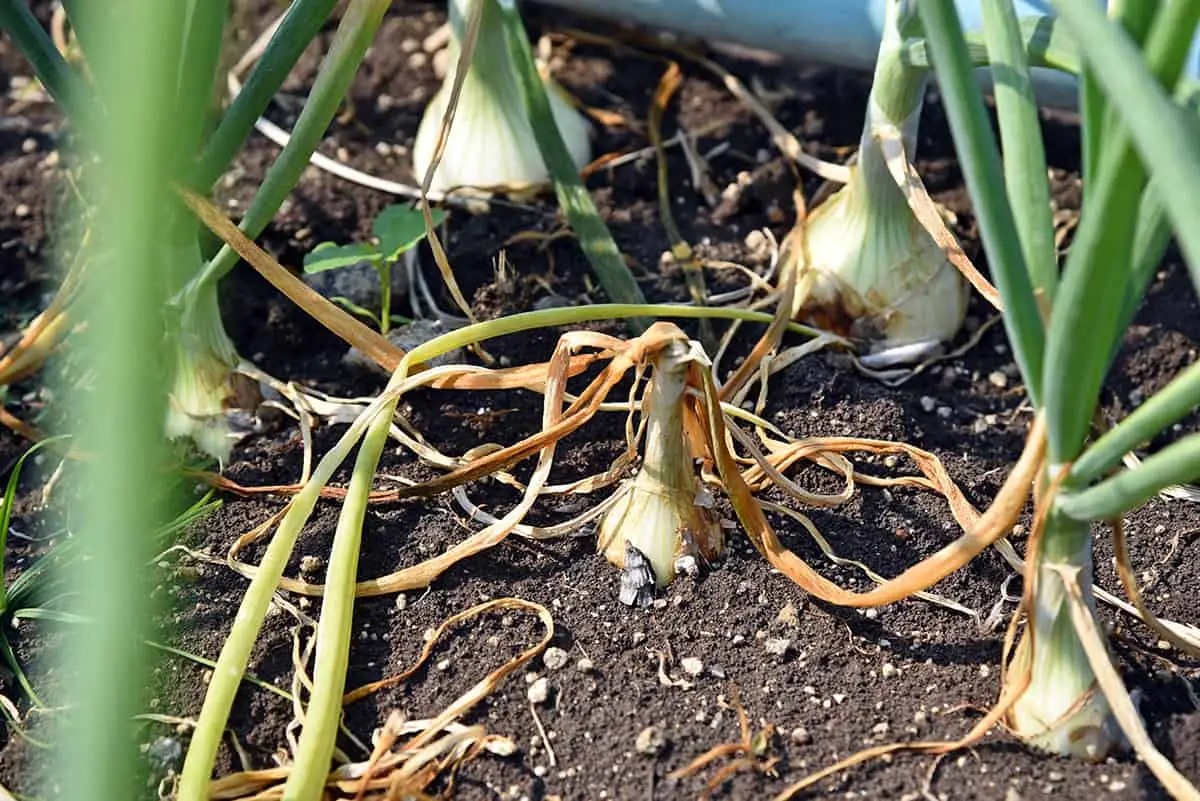
Ants also like to set up shop on the onion plants themselves, making it easier to get to the mealy bugs and slugs that are snacking on the plants. Ants do not eat the mealybugs, aphids, or other insects that attack the plant either.
But they eat the honeydew-like secretions the insects leave behind on the plant. Once they have established a presence, they feast on the plants.
What Other Bugs Eat Onions?
Ants are repelled by onions unless they are attacked by other bugs. So, let’s see what other bugs eat onions or onion plants.
Onion Thrips:
Onion thrips, only 1-2 mm long, wreak havoc on your precious onion plants. These tiny terrors are virtually invisible to our eyes.
They feed on your onion leaves and lay eggs on them. They also carry harmful pathogens like the Iris yellow spot virus, which creates unappealing yellow spots and mottling on your leaves.
A Thrip attack will also leave your leaves curly. This phenomenon especially occurs when they attack sage trees, it makes the sage leaves curl.
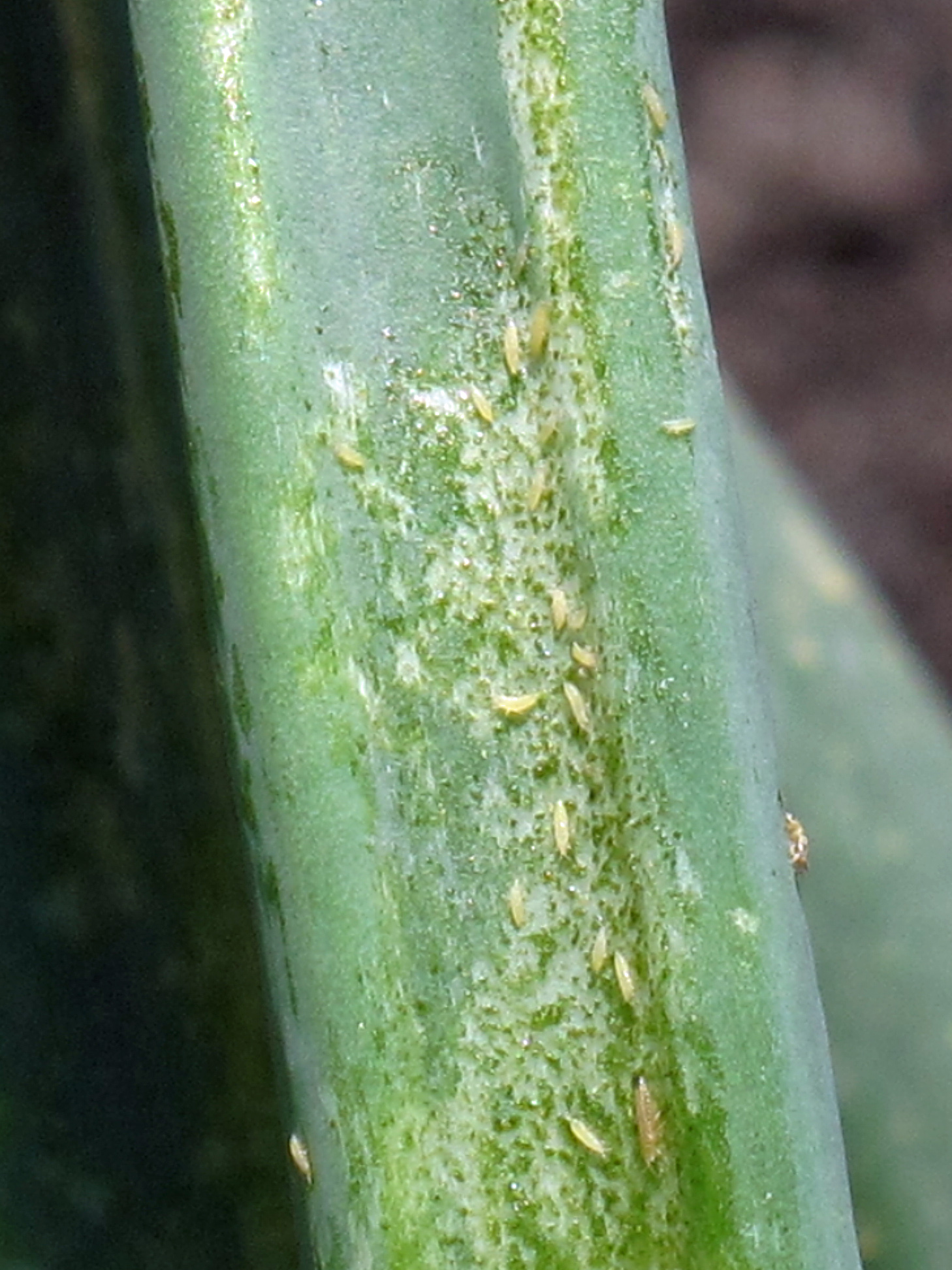
Slugs:
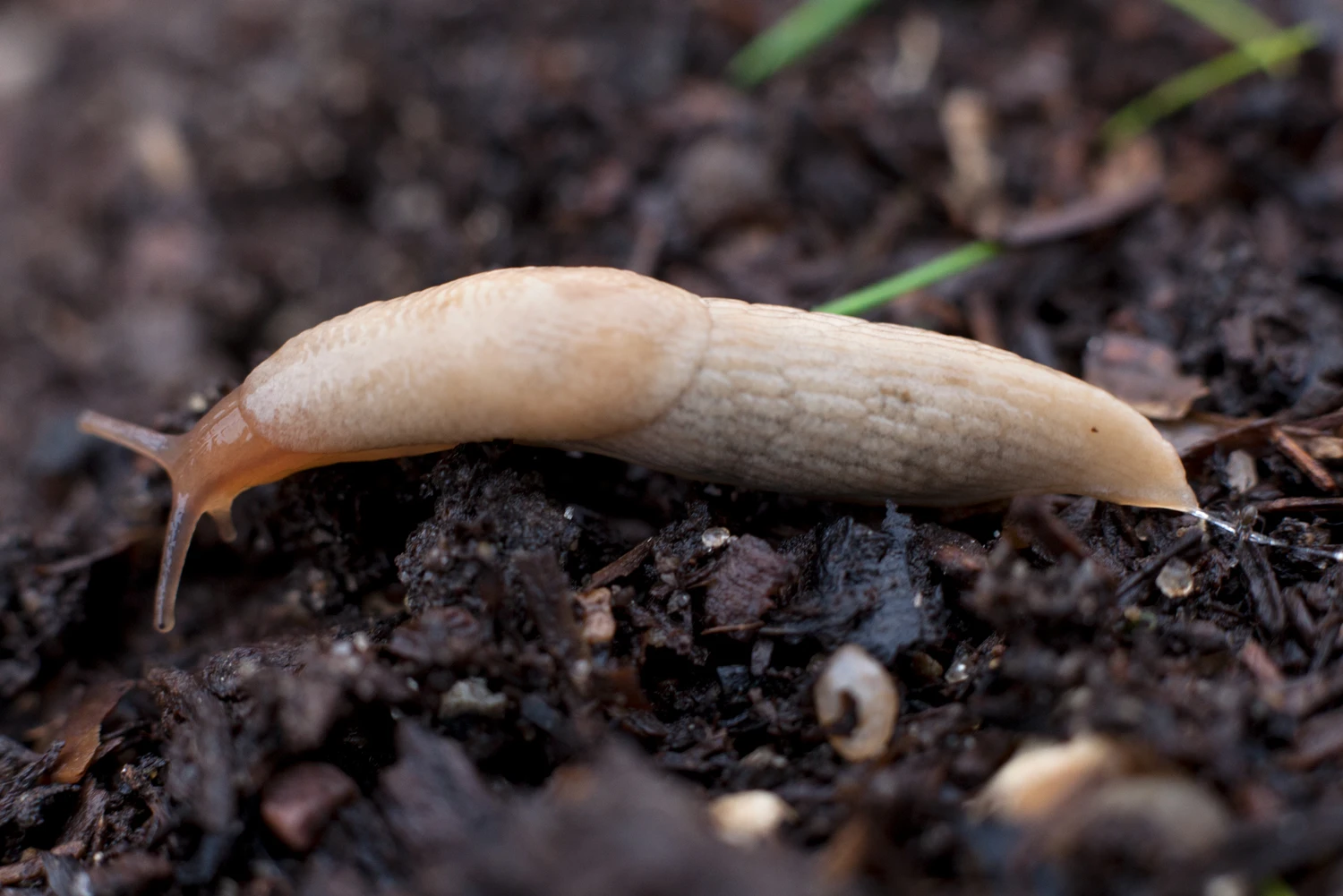
Slugs and snails usually munch on decaying organic matter in the soil. But sometimes, they turn their sights on onions.
If you spot your onions missing their tops or find them bitten clean off, you have a slug problem. Also, they leave behind a trail of silver slime. They may not be as small as onion thrips, but their hunger can be just as destructive.
Bulb Mites:
The bulb mites, measuring just 0.5-1 millimeter, make it their mission to infest both field-grown and stored onion bulbs. It’s yellowish-white or pinkish appearance and oval shape resemble miniature balls with four pairs of short, brown legs.
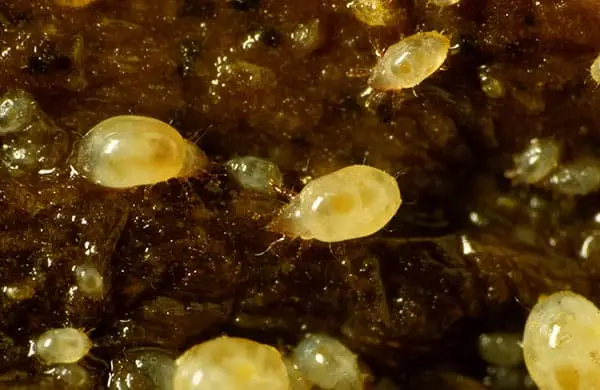
Nematodes:
Nematodes, the microscopic roundworms, lie in wait within the soil’s depths. Their primary targets are the onion roots, bulbs, and stems, inflicting hidden harm.
Once they infiltrate, they open doors for other soil-dwelling pathogens and microorganisms, rotting the onion from within.
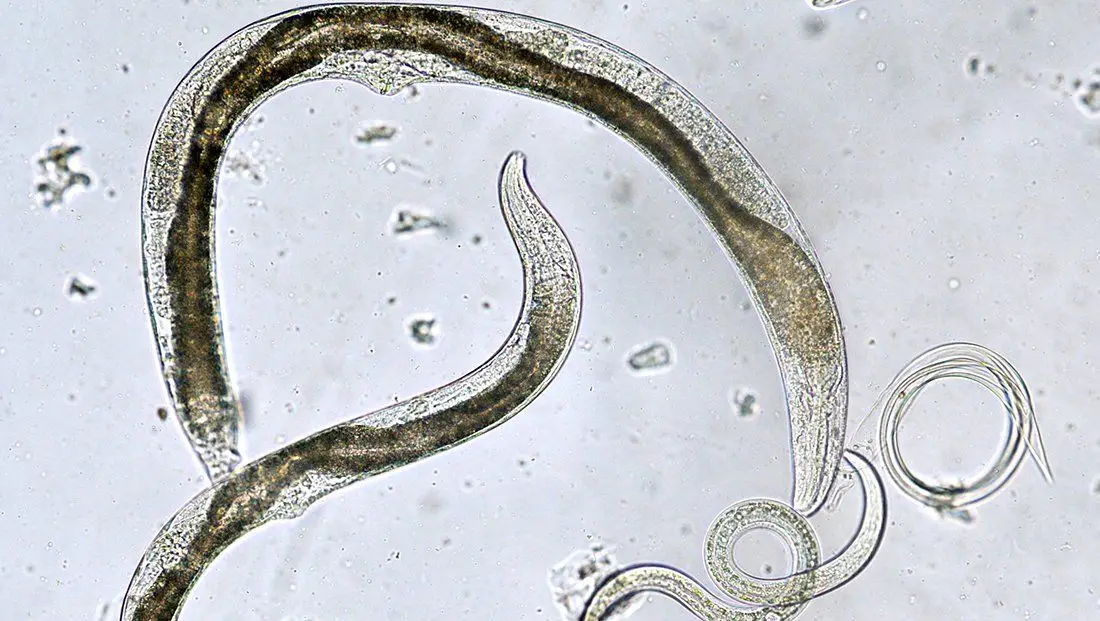
Wheat Curl Mites:
Onions in storage are prone to wheat curl mites. They are too small for the naked eye, measuring just 0.01 inches. They devour the foliage before getting to the sprouting bulbs, causing rot and dryness.
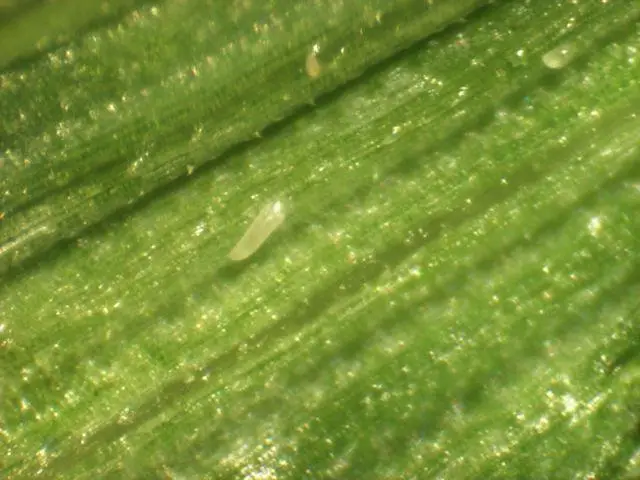
These are not the only bugs that can harm your onions, there are many others that can be just as deadly.
How To Save Your Onions From Bugs?
By now, it should be clear to you that an ant attack is not a single problem but rather it’s a symptom of other bugs infesting your onions. So, you can follow the tips we prescribed below to handle them-
- Handpick the pests, either drowning them in soapy water or crushing them.
- Use insecticidal soap to remove pests by breaking down their protective waxes and causing damage to their membranes.
- Apply horticultural oils, like neem oil, which interfere with insect metabolism and feeding, blocking their air holes and inhibiting growth.
- Create a homemade pest spray by combining baking soda, mild dish detergent, olive oil, and water to repel bugs and treat blight and mildew on onion leaves.
- Establish a physical barrier by wrapping the stem and leaves with aluminum foil to prevent pests, such as cutworms, from accessing the plants.
- Maintain a clean garden environment by removing damaged plant parts and creating a dry soil buffer around the garden to discourage pests.
- Use row covers or insect-proof materials to keep onion flies away from seedlings and prevent egg-laying.
- Apply a layer of sand or wood ash around the plants to deter egg-laying by pests.
- Regularly monitor onion plants for pest activity and take immediate action when pests are detected.
- Consider implementing preventive measures, such as crop rotation, to disrupt pest life cycles and reduce infestations.
- Consult with local agricultural extension services or professionals for tailored pest management strategies and advice.
- Keep records of pest occurrences and treatment methods to improve future pest control efforts.
How To Get Rid Of Ants Naturally?
Now, naturally, you may think getting rid of other bugs will stop the ants from eating your onion plants. But in reality, this may not be the case. So, knowing how to get rid of ants is also important.
But ants are strong insects and the heavy use of pesticides can alter the taste of the harvest. For example, using too much pesticide can cause cucumbers to taste like chemicals.
So, here’s how you can get rid of ants naturally-
White Vinegar:
Mix three parts vinegar with one part water and spray it around onion plants or in the yard. The strong scent of vinegar will mask the ant scent trails, and confuse their tracking abilities.
Pepper:
Sprinkle ground black or cayenne pepper around the plants or along ant scent trails to repel ants. Also, you can create a pepper and water spray and apply it.
Cinnamon:
Sprinkle cinnamon, especially Saigon cinnamon around the plants. The strong smell of cinnamon acts as a natural repellent and disrupts ants’ movements. Cinnamon essential oils can also do the job for you.
Fresh Mint:
Planting fresh mint besides your onion plants creates a natural barrier against ants and other insects. The scent of mint acts as a deterrent while adding a pleasant aroma to your garden. Wintergreen, geranium, thyme, clove, and rosemary, can be used as an alternative.
Flour:
You can apply all-purpose flour generously around your garden to disrupt ants’ pheromone trails. Alternatively, use a sifter to create a dusting of flour directly along their path. This will cause confusion and hinder their movement.
Citrus:
Squeeze lemon juice into a spray bottle or rub a pureed blend of orange peel and water on your plants to deter ants from crossing over. Additionally, placing leftover citrus rinds in the garden acts as an organic disincentive.
Coffee Grounds:
Sprinkle coffee grounds around the stems of indoor and outdoor onion plants. The scent and texture of the coffee grounds repel ants and discourage them from approaching the plants.
Sugar:
To divert ants away from your home and onion plants, create a sugar trail leading to a compost pile. By providing them with an alternative food source, ants are less likely to invade your onion plants.
Mythbusting: Does Baking Soda Kill Ants?
You may have seen on the internet that baking soda works wonders in repelling or killing ants. But in reality, that’s not true.
There is no scientific evidence backing up this claim and baking soda does not have any chemical compounds that should kill ants. So, it would not be wise to use baking soda and expect to get rid of ants.
Frequently Asked Questions (FAQs):
Do ants eat tomatoes?
No, ants do not eat tomatoes. They are attracted to the sugary honeydew excretions released by aphids hiding somewhere among the foliage. If you see ants on your tomato plants, look for aphids.
What smell do ants hate?
Ants are repelled by the smell of citrus, peppermint, vinegar, cayenne pepper, and coffee grounds. Ants have a strong sense of smell and you can use these to keep ants away from your home.
What are ants’ favorite human foods?
Ants’ favorites foods are sweet foods (like sugar and honey), meat, fat, grains, and seeds. Ants are omnivores and they eat a variety of foods compared to other bugs. Also, they are known to eat various fruits.
Conclusion
Since we are at the end of the article, we hope we have answered the question “Do ants eat onions” well enough.
Ants are normally not interested in your onions or vegetables but ant infestation means the plants are under attack from aphids or other insects. That’s why it’s necessary to take good care of your plants.
- Why Are There Still No Tomatoes in My Tomato Plants? Let’s Fix the Issue! - July 13, 2023
- Water Propagation White Stuff on Roots: Everything You Should Know! - July 11, 2023
- String of Dolphins Drying Up: Solved! - July 11, 2023
